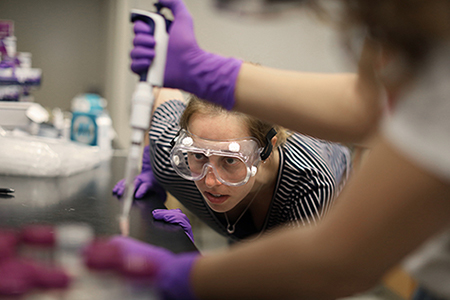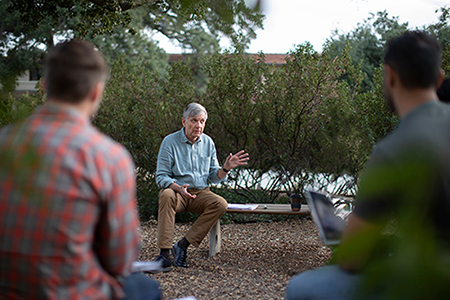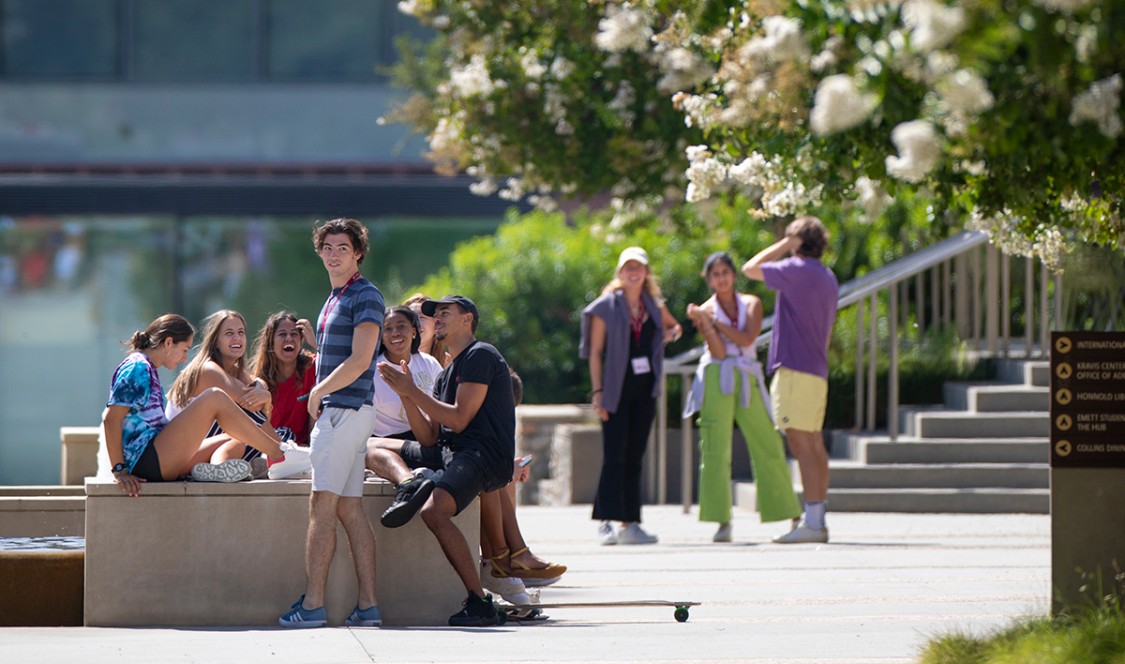How did CMC’s vision and mission make it one of the nation’s top liberal arts college in just 73 years, and how will it continue to drive excellence going forward?
A committee of 38 faculty, students, alumni, trustees, and administrators, examined these questions through most of the 2018-2019 academic year. Their findings, captured in The 2019 CMC Strategy Report, reaffirm CMC’s mission and identify the most critical strategic priorities for the next decade.
 The 2019 Strategy Report is based on a foundational vision—to educate students in the liberal arts for thoughtful and productive lives and responsible leadership in business, government, and the professions. Today, supporting the founding vision as the College’s top priority are two key strategic pillars: strengthening the sciences, computer science, and data science; and expanding student opportunity.
The 2019 Strategy Report is based on a foundational vision—to educate students in the liberal arts for thoughtful and productive lives and responsible leadership in business, government, and the professions. Today, supporting the founding vision as the College’s top priority are two key strategic pillars: strengthening the sciences, computer science, and data science; and expanding student opportunity.
These priorities recognize that the greatest political, social, and economic challenges –both today and in the future – are increasingly driven by exponential leaps in science and technology—from gene editing, artificial intelligence, and cryptocurrency to the role of data science in business, policy, and our broader culture.
“The exponential growth of technology is outpacing the technical, ethical, economic, and policy intelligence of our civilization,” said President Hiram E. Chodosh. “That means CMC students today require an understanding of the forces that are shaping our lives, from multiple, integrated disciplines of expertise and perspective.
The 2019 Strategy Report calls for significant investments in integrated sciences and computation to affirm the continued relevance of what CMC’s founders called the Original Idea. It posited a “rationally balanced [education] to meet the political, economic, social, and cultural needs of students so as to prepare them for tomorrow’s world of affairs.”
 The 2019 CMC Strategy Report notes that the CMC strategic plans of 1985, 1993, and 2002, also called for bolstering science and computer science in the curriculum. Today, CMC continues on this path with an initiative to create an independent science department and construct a new facility for integrated sciences, including the greater incorporation of computation and data science across all disciplines.
The 2019 CMC Strategy Report notes that the CMC strategic plans of 1985, 1993, and 2002, also called for bolstering science and computer science in the curriculum. Today, CMC continues on this path with an initiative to create an independent science department and construct a new facility for integrated sciences, including the greater incorporation of computation and data science across all disciplines.
According to E. David Hetz ’80, P ’10, chair of the Strategy Committee and Vice Chair of the Board, The 2019 Strategy Report reaffirms the College’s steadfast commitment to ethical and responsible leadership. “Throughout its history, CMC’s unwavering commitment to its focused mission and distinctive vision has provided the foundation for its evolution, growth, and success,” Hetz said. “As a result, CMC has emerged as one of the nation’s leading liberal arts colleges, and one that is widely admired for its distinctive approach to undergraduate education.”
As CMC makes major investments in faculty and facilities, it must also invest more to support students in an environment of rising college costs. Not only have tuition and fees consistently outpaced inflation at colleges, but the kinds of ambitious students who enroll at CMC pursue off-campus internships and research opportunities that often require funding. Expanding student opportunity today still means providing scholarship aid to make enrollment possible for the best students, regardless of financial need. It also means ensuring that all CMC students can pursue their career and academic passions beyond campus and in co-curricular activities.
 CMC has made deep investments in student support, including the $25 million Kravis Opportunity Fund, which helps fund expenses beyond tuition and fees, elevating the Student Imperative for financial aid and student opportunity funding.
CMC has made deep investments in student support, including the $25 million Kravis Opportunity Fund, which helps fund expenses beyond tuition and fees, elevating the Student Imperative for financial aid and student opportunity funding.
Fundamentally, the integrated science and computation initiative and student opportunity investments support what the founders envisioned: a residential college, with an emphasis in economics and government, excellent in every department, led by top interdisciplinary teacher-scholars in a community balanced in diverse perspectives, as well as ethical in thought and behavior through the cultivation of strong character.
Additional elements of The 2019 Strategy Report include efforts to:
- Support faculty in deepening and broadening the intellectual rigor of CMC’s academic departments and programs.
- Continue to invest in CMC’s academic departments, and foremost its programs in economics and government so that each maintains its leadership position in its respective field.
- Grow innovation within the curriculum.
- Prioritize and invest in faculty recruitment, supporting diverse course materials and pedagogies, and co-teaching across differences in both perspective and expertise.
- Enhance CMC’s capacity to provide a full array of research opportunities by further strengthening institutes, centers, and labs, and by expanding support for faculty-student research.
- Support training in dialogue skills, community expectations, freedom of expression, ethics, viewpoint diversity, and institutional values of respect and civility by optimizing such programs and resources as the Athenaeum, the CARE Center, and the Open Academy.
- Invest further in CMS Athletics as the most competitive athletic program for the scholar-leader-athlete.
- Promote a health-positive campus community through strong physical, behavioral, and mental health strategies and resources on campus.
“CMC may look different today than it did in 1946,” said Board Chair David Mgrublian ’82, P ’11, “but there is so much that is familiar to a graduate of any decade. As we evolve and grow, we do so by building on the best qualities of what we always have been.”

